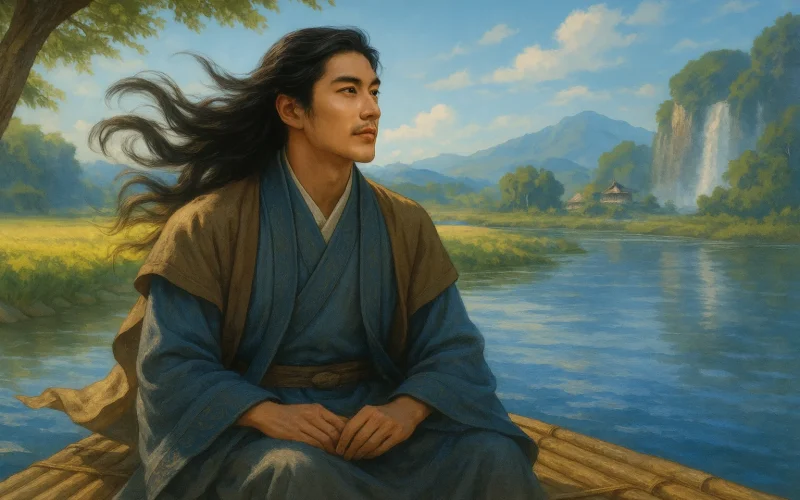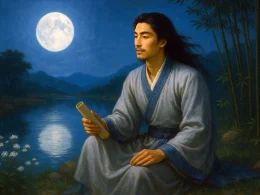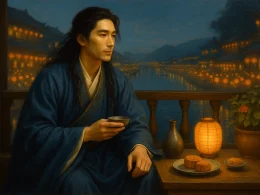Meng Haoran (孟浩然), 689-740 A.D., a native of Xiangyang, Hubei, was a famous poet of the Tang Dynasty. With the exception of one trip in the north when he was in his forties, when he went to Chang'an and Luoyang in search of fame, he spent most of his life in seclusion in his hometown of Lumenshan, or roaming around the world. Li Bai fully praised Meng Haoran in "Gift to Meng Haoran", and Du Fu called his "clear poems can be passed on".
Li Bai's poem "A Message to Meng Hao-ran":
"master, i hail you from my heart,
and your fame arisen to the skies....
renouncing in ruddy youth the importance of hat and chariot,
you chose pine-trees and clouds; and now, whitehaired."
In the star-studded poetry world of the Tang Dynasty, Meng Haoran, as an outstanding poet of the Kaiyuan period, not only enriched the subject matter of his poetry by creating a large number of landscape and idyllic poems, but also contributed to the prosperity of Tang poetry with his light and distant style that shone with a dazzling luster.
Main Experience
Meng Haoran was born around 689 AD and died in 740 AD. He was born into a family of small estate owners, and neither his father nor his ancestors may have been government officials, but he was well educated in orthodox Confucianism from an early age. Although he lived a modest and simple life, he came from a family of scholars, and his family was still well-off, and in such a family he was equipped with a good education in economics and literature.
Xiangyang is located in the bay of the Han River, with Wanshan Mountain in the west, and Chushan Mountain and Da Nang Mountain in the south, with many scenic spots in its territory. Meng Haoran's home was near Da Nang Mountain, outside of Xiangyang's Nanguo, and was known as Han Nan Yuan, also known as Jian Nan Yuan. From there, you can take a boat across the Han River, southeast to Lumen Mountain, where he lived in seclusion. Fertile fields and fertile soil, nurtured the poet; famous mountains and beautiful water, cultivated the poet's aesthetic taste.
His life experience was relatively simple, and most of his life was spent in seclusion in Xiangyang. The Confucian principle of living in the world is "to be rich is to help the whole world, and to be poor is to be good to oneself". Meng Haoran was a young man with great aspirations, and from his youth to his prime years, he had traveled between the two capitals in great fear, and he had also lived in seclusion behind closed doors, boasting of his purity, and hoping to take the "shortcut to the South", all in order to seek an official position. But he could not get a strong invocation of the rulers, but also by the suppression of the power traitors, and finally could not help but to fall and return, living in seclusion.
Wang Changling traveled to Xiangyang, when Meng Haoran disease rash hair back will heal, because happy, wave love banquets, eat fresh fish and shrimp and other hairy things, the disease recurred, died in the metallurgical city of South Park, at the age of fifty-two. His simple life ended like this, but he was deeply loved by later poets. Soon after his death, Wang Shiyuan sought his posthumous writings and compiled a collection with a preface. When Wang Wei passed through Xiangyang, he painted a portrait of Meng Haoran in the Assassin's Pavilion and named his pavilion Haoran Pavilion.
Literary Achievements
In literary history, Meng Haoran was a poet in the transition period from the early Tang to the Sheng Tang, twelve years older than Li Bai and Wang Wei, and twenty-three years older than Du Fu. His poems inherited the best traditions since the Han and Wei Dynasties, and had a positive influence on the opening of the integrated and complete poetic style of the Sheng Tang.
Meng Haoran was ambitious and eager to use the world from his youth, and although he inevitably tended to be negative after many failed attempts to get a job, he would never bow and bend his knees to attach himself to the powerful and the rich. He was repeatedly suppressed by the rich and powerful and failed to get an official position, so he left the countryside and traveled to the rivers and lakes to enjoy the landscape; at the same time, he continued to write poems to express his injustice.
Traveling Poems
Meng Haoran has some traveling poems, through the description of scenery to express the nostalgia and disillusionment of the traveler, writing the scenery in the XingShi, not just chanting flowers and grasses to mock the wind and snow only. The poem "Looking at the Countryside on the Way" starts with the setting sun, expresses the nostalgia at sunset, and associates it with the disillusionment of one's career and the drifting to a foreign land. The "deep snow" and "dark clouds" are not only what you see, but also a metaphor for the uncertainty of the career path, which is a deep sentiment. Another example is "Early Cold River with Wistfulness", with wood fall, north wind, lonely sails, lost in the world to write the feeling, but also sad and touching.
Meng Haoran was a man of "loose spirit, saving difficulties and resolving disputes", and he was originally a man of valor and chivalry. Sent into the poem, the words are often overflowing with chivalry, high hopes for the aspirants, to give enthusiastic encouragement, and even the sword to give. This kind of heavy RanNuo, push righteousness of the strong and free temperament, quite similar to the age of Tao Qian, and the Han Dynasty and the chivalrous spirit of the common. Meng Haoran's style had a clear influence on Li Bai.
Idyllic landscape poems
Meng Haoran's landscape poems were also written in a magnificent and robust manner. The light style of idyllic landscape poems accounted for a major part of Meng Haoran's poems. This reflects his aesthetic taste and is the main achievement of Meng's poems. There are more than two hundred of Meng's poems in existence today, of which forty-two are written in 50 characters with the word "qing" explicitly used. In his poems, water is clear water, river is clear river, wind is clear wind, string is clear string, light is clear light, sound is clear sound, and sometimes even the ape whistle which has always made people sad and sorrowful sounds clear and pleasing to the ear, and is able to purify the soul. Write about the leisure of seclusion and the sadness of traveling, the style is open and natural, light and flavorful. Reading this kind of poem is like drinking a low-grade wine, with a full aftertaste, the more you taste, the more flavorful it is.
Hermit
Meng Haoran's poems were basically created in the flourishing days of the Kaiyuan era. At the same time, as a feudal hermit who spent most of his life hibernating in a corner of Xiangyang, he was not involved in the vortex of the political struggle at the upper level, so it was impossible for him to see the social contradictions that had in fact been revealed at that time, and what he cared about and lamented about was mainly the individual's personal fortune and poverty rather than the people's sufferings. In this way, his works can only be limited to the description of idyllic seclusion and the leisure of mountain and water, expressing the sadness of personal disillusionment with the career, and thus lack of broad and deep social content and glowing ideals.
Compared with great poets such as Li Bai and Du Fu, Meng Haoran is not a talented poet. His poems are not only few in number and narrow in subject matter; in terms of poetic style, he is good at five words, and also stops at short pieces, but not grandiose, which is the limitation of his lack of talent and life accumulation.
Meng Haoran's poems did not have their own book, until after his death, Wang Shiyuan "countryside purchase", "Shixiqiu Quartet", set his poems two hundred and eighteen, compiled into four volumes, began to have the Meng collection of the world.






























